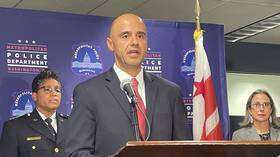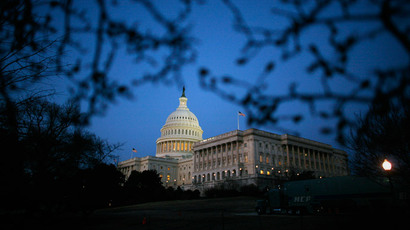Congress won’t touch NSA reform until after midterms, may wait until 2015 – report

As the November midterm elections inch closer, the chances of Congress taking up a widely supported bill that would reform the National Security Agency’s mass surveillance program are gradually shrinking.
In a new report by the National Journal, multiple unnamed sources said the reform bill – dubbed the USA Freedom Act – is not a priority for Congress as it returns from recess. While one Senate aide said it is “extremely unlikely” that lawmakers will consider the bill in September, it is also unclear if any action will be taken at all during the rest of the year.
Instead, members of the Senate and House of Representatives are likely to remain focused on other issues, including attempts to avoid another government shutdown by passing a continuing resolution. With elections on the horizon, some are wary of trying to weave such a large bill through Congress before voters head to the polls.
If true, the news is certainly a blow to reformers, who have been urging Congress to beef up its oversight of the National Security Agency (NSA) for months. Ever since classified material began leaking to the press via former NSA contractor Edward Snowden, civil liberties advocates have been calling for changes to the way the department operates its bulk surveillance program.
Specifically, USA Freedom Act would place metadata records – information such as the time a call was made, the duration of the call, but not the actual content of the call itself – in the hand of telephone companies instead of the NSA. If intelligence agencies wanted to acquire the data, they would have to plead their case to the Foreign Intelligence Surveillance Court (FISA).
Other reforms are also included in the bill, though when the House passed the original draft back in May, reform advocates criticized it for not doing enough. Sen. Patrick Leahy (D-Vt.) went back and strengthened the bill to earn more support, but now its fate is unclear.
Although National Intelligence Director James Clapper and Attorney General Eric Holder both came out in favor of the bill recently, the proposal lacks the endorsement of significant lawmakers. Sen. Dianne Feinstein (D-Calif.), the chairman of the Intelligence Committee, has not offered her support, nor have noted reform-advocates like Sens. Ron Wyden (D-Ore.) and Mark Udall (D-Colo.). That’s left supporters trying to convince Republicans to back the bill.
"If the USA Freedom Act is not passed this Congress, we are really in uncharted territory, and the process has to start all over again," said Harley Geiger, senior counsel at the pro-reform Center for Democracy & Technology, to the Journal. "All the elements for reform are in place now, but it just happens that we don't have much time."
Wyden and Udall, however, believe that waiting could strengthen their hand. The two senators reportedly think they could effectively push for weighty changes within the Patriot Act – cited as the backbone of the NSA’s surveillance efforts and set to expire in June 2015 – such as mandating warrants for “backdoor” searches on American data that is captured indirectly on operations targeting foreigners.













